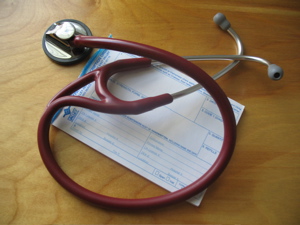Gone are the days where you should believe what your doctor tells you simply because he or she is a doctor. Medicine can be complicated, and it changes all the time: new drugs, new resistant bugs, and new scientific studies that teach us that sometimes what we once thought was good is in fact killing people. Your job as an informed consumer of healthcare is to make sure that the benefits outweigh the risks. The stakes are too high for you to assume that your doctor knows this.

We love talking about benefits -- that's the part of the commercial with smiling lovers and chirping birds. But talking about risks is scary, so we avoid it or mention them really fast when the credits are rolling. When is the last time YOU asked about the risks of a treatment or a test?
Case 1: The doctor says: "You should have a colonoscopy." How can you decide if this makes sense for you if she doesn't also tell you that there is a 1 in 14,000 chance you will die from complications of the colonoscopy? This doesn't mean you shouldn't do it. It means there had better be a greater than 1 in 14,000 chance that it will save your life or make you healthier. (And your doctor should tell you that for colon cancer screening, the benefits indeed outweigh the risks for adults between 50 and 75 years old.)
Case 2: "There's a spot on your chest x-ray. It's probably nothing, but let's get a CT scan to make sure." Wow, what a caring doctor. What will you say to him? That's right, you should ask: "What are the benefits and risks?" If he explains them, including the fact that repeated CT scans increase your risk for cancer -- great. If she says, "I don't know, but let's find out" -- great. If he just wants you to go ahead with the treatment based only on his experience, fire him.
For doctors, it's quite difficult to find out the actual risks and benefits of the tests and treatments we recommend. You might expect that there is a regularly updated database of the top 100 treatments and invasive tests, which quantifies the risks and benefits for each of them. It doesn't exist! Most of the data needed to create such a database does exist, but it's scattered across many research articles and textbooks. I'm willing to bet that if more of you demand this information from your doctors, that database will soon exist. And I know it will help me practice better medicine.
Demand the facts and make informed decisions. Your life depends on it.
